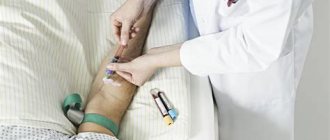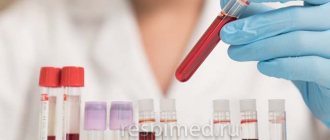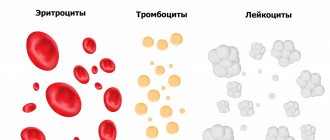Timely donation of urine and blood helps to monitor the condition of the body and sound the alarm in the event of the development of pathologies of the cardiovascular and hematopoietic system. In our article we will talk about the features of conducting laboratory tests in people suffering from alcoholism, and also talk about the effects of alcoholic beverages on the blood.
- Read in the article:
- The effect of alcohol on blood tests: main indicators
- Effect on general blood test
- Effect on cholesterol
- Effect on biochemical blood test
- Effect on blood sugar
- Effect on blood clotting and thickness
- Impact on ESR
- Effect on blood saturation and oxygen
- Effect on leukocytes, platelets, hemoglobin
- Detoxification of the body from alcohol in
- Hangover dropper
- Quick withdrawal from binge drinking
- FAQ
- Is it possible to drink alcohol before tests?
- Does a biochemical blood test show alcohol?
- How long before donating blood should you stop drinking?
- Is it possible to drink beer before donating blood?
Treatment prices:
| Sign up for a free and anonymous consultation with a narcologist | 0 ₽ |
| Initial consultation with a narcologist | for free |
| Consultation with a psychologist in person or Skype | 3 000 ₽ |
| Psychiatrist consultation | 5 000 ₽ |
| Psychodiagnostics / pathological diagnostics | 7 500 ₽ |
| Narcopsychotherapy | 50 000 ₽ |
| Consultation with a psychologist and selection of a treatment and rehabilitation program for an addict | for free |
| Intervention session | 12 000 ₽ |
| Social rehabilitation of alcohol addicts | for free |
| Outpatient rehabilitation in Moscow | 33 000 ₽ |
| Standard rehabilitation program | 40 000 ₽ |
| Intensive rehabilitation program | 80 000 ₽ |
| Premium rehabilitation program | 120 000 ₽ |
| Medical and social rehabilitation (21 days) | 150 000 ₽ |
| Rehabilitation Spain, Bulgaria | 200 000 ₽ |
| VIP rehabilitation program | 350 000 ₽ |
| Online addiction rehabilitation course | 28 000 ₽ |
| Rehabilitation of age-related alcohol addicts | 50 000 ₽ |
| Rehabilitation of drug addicts | 60 000 ₽ |
| Adolescent social-psychological-pedagogical rehabilitation | 70 000 ₽ |
| Psychotherapy | 5 000 ₽ |
| Family psychotherapy | 6 000 ₽ |
| Support groups for loved ones of addicts | for free |
| Webinars for relatives of addicts | for free |
| School for codependents | 3 000 ₽ |
| Transfer support | negotiable |
| Motivation for treatment | 6 000 ₽ |
| Escort to the clinic | 6 000 ₽ |
| Testing (urine/blood/hair) | specify |
Expand
Still have questions? Call us!
8
Free consultation and appointment
How is the test performed?
Blood can be donated for analysis for SDT in our clinic or by calling a laboratory technician to your home in Moscow. In the laboratory and at home, our staff strictly adheres to the technology of collecting biomaterial and all the rules:
- Sterile gloves on the hands of a specialist.
- The vein puncture site is disinfected only with alcohol-free antiseptics.
- The taken biomaterial is divided into two samples - test and control.
- Two sterile tubes of blood are sealed and sent for testing in a special container.
CONSULTATION WITH A SPECIALIST
8
Around the clock
We'll call you back in 1 minute
The effect of alcohol on blood tests: main indicators
According to research, even a small amount of alcohol can negatively affect laboratory test results. Drinking alcohol reduces the level of blood components, or, on the contrary, increases their concentration and the intensity of clotting.
Effect on general blood test
Drinking alcohol before taking a general test leads to a significant change in laboratory test parameters. In particular, the parameters of lipid metabolism change. This point is very important before preparing for surgery and serious instrumental studies. This means that before donating blood in preparation for surgery, abstaining from alcohol is the most important measure.

Effect on cholesterol
Increased cholesterol due to alcohol consumption leads to the following diseases:
- Ischemia and infarction: As a result of narrowing of the lumen of blood vessels caused by cholesterol deposits, blockage occurs. Impaired blood supply leads to local atrophy of heart tissue, which leads to death;
- Stroke: disruption of the blood supply to the brain vessels due to thrombosis. Leads to death or disability of a person;
- Failure of internal organs caused by trophic disorders. In some cases, the trophism of the tissues of the visual apparatus is disrupted, which leads to blindness;
- Hypertension: persistent increase in blood pressure due to alcoholism.
People who drink alcohol doom their body to a sharp decrease in good cholesterol. At the same time, the concentration of bad cholesterol increases significantly, and cholesterol plaques appear in the lumens of blood vessels. One of the most common and serious complications of atherosclerosis is a heart attack caused by the rupture of a cholesterol plaque inside the blood vessels. The deposition of bad cholesterol occurs not only due to drinking alcohol, but also eating fatty snacks.

Effect on biochemical blood test
Obtaining false test results and drinking alcohol can lead to the following undesirable consequences:
- Detection of non-existent diseases . As a result, the doctor prescribes additional, often unnecessary tests. This leads to an increase in the time of diagnosis and therapy, and also affects a person’s budget when visiting a private clinic;
- A false “good” test result can lead to ignoring the development of a serious disease . As a result, the patient may miss the “golden hour” of medical care, and the disease progresses rapidly. The most dangerous consequences arise from ignoring cancer or pathologies of the hematopoietic organs;
- Drinking alcohol makes a person feel unwell at the time blood is drawn . The viscosity of the blood increases, and after collection, dizziness and even loss of consciousness may occur.

Effect on blood sugar
According to research, ethyl alcohol has a serious effect on sugar in the human body. A small dose of alcohol can increase blood sugar, but in other cases it can lower it. This effect can lead to the development of serious diseases or the detection of false sugar spikes, requiring additional tests for diabetes.
Effect on blood clotting and thickness
Ethanol helps increase blood viscosity. As a result, blood clots form, leading to thrombosis of the heart vessels. The patient develops megaloblastic anemia, and there is a risk of death due to thrombosis of the vascular walls.
Impact on ESR
Taking an ESR test is the main way to determine inflammatory, autoimmune, cancer and infectious diseases. Ethyl alcohol affects the erythrocyte sedimentation rate and can either increase or decrease the actual value.
Effect on blood saturation and oxygen
Once in the human body, ethyl alcohol “takes away” the main components of a living cell: water and oxygen. As a result, after drinking alcohol, the oxygen concentration in the blood decreases sharply.
License and certificates:


Effect on leukocytes, platelets, hemoglobin
Ethanol intoxication leads to the following changes in the blood composition:
- The lipid membrane component of red blood cells is oxidized, the cholesterol content increases;
- Thrombocytopenia of varying severity occurs. The risk of thromboembolic complications (blood clots entering the lumen of blood vessels), leading to sudden death of a person, increases. According to studies, ethanol negatively affects platelet aggregation;
- If a person suffers from a bacterial disease, the number of white blood cells increases. A high concentration of neutrophils and leukocytes is aimed at fighting infectious agents: this is a natural immune reaction. Ethyl alcohol helps reduce the number of antibodies, which leads to a sharp weakening of the body's defenses. As a result, the incidence of bacterial diseases in alcohol addicts increases significantly.
Numerous studies have proven the negative impact of alcoholic beverages on the human hematopoietic system. This means that to maintain health it is necessary to give up alcohol in a timely manner.
Detoxification of the body from alcohol in
The AlkoZdrav drug treatment clinic provides comprehensive detoxification of the body from ethyl alcohol metabolites. During therapy, we use modern, certified drugs, the latest equipment and the rich experience of our narcologists. We provide an individual approach to each person and guarantee anonymity of treatment at any stage.

“AlcoZdrav” provides the best conditions for keeping patients in the wards. In addition, we are guided by the principles of comprehensiveness, comply with all aspects of medical ethics, SanPin requirements for sanitary and anti-epidemiological measures.
Hangover dropper
The infusion of infusion solutions is most popular for quickly cleansing cells and the bloodstream of ethyl alcohol metabolites. The following solutions are used:
- Water-salt solutions to combat dehydration;
- Vitamin and mineral complexes to replenish the body's reserves;
- Antihypertensive drugs, mood stabilizers, analgesics and other symptomatic drugs;
- Nootropics that restore brain activity.
Placing a drip helps to quickly restore the body, cleanse it of ethyl alcohol metabolites and eliminate a hangover.

Quick withdrawal from binge drinking
One of the fastest ways to get rid of binge drinking is considered to be UROD (ultra rapid opioid detoxification). The hardware detoxification method is carried out under general anesthesia and does not cause any unpleasant sensations in the addict. During drug-induced sleep, the body of an alcohol addict is cleansed of acetaldehyde and other toxins caused by alcoholism, and the blood plasma is renewed. After detoxification, they resort to the following stages of alcoholism treatment: psychotherapy, recovery in a rehabilitation center.

Who gets the test?
The analysis is carried out to confirm the diagnosis of chronic alcoholism and to check those whose profession and work activity is incompatible with alcohol addiction. Typically it may be required:
- When registering with state drug dispensaries. Mandatory deregistration procedure.
- During the medical examination, taxi drivers, pilots and representatives of professions related to human safety.
- To obtain a driver's license, weapons permit.
- Victims of serious injuries before surgery.
- In private drug clinics for an objective assessment of the results of treatment for alcoholism and recovery from binge drinking.
- When diagnosing liver cirrhosis, alcoholic hepatitis, pancreatitis and other diseases caused by alcohol addiction.
FAQ
Is it possible to drink alcohol before tests?
Alcohol negatively affects test results. As a result of alcohol consumption, the concentration of some elements in the blood increases and decreases in others. This leads to a false laboratory test result. The following changes occur due to ethanol consumption:
- Reduced blood sugar and urea levels;
- Decrease in red blood cells and hemoglobin;
- Reducing lactate.
As a result of drinking alcohol, blood viscosity increases. This introduces significant difficulties into the blood sampling process and also contributes to increased thrombus formation.

Does a biochemical blood test show alcohol?
As a result of drinking alcohol, false research results are noted. Significant changes in indicators occur, but this analysis does not demonstrate the presence of ethanol in the body. Serum CDT is used to determine the frequency of alcohol abuse.

How long before donating blood should you stop drinking?
Experts recommend refraining from drinking alcohol at least two to three days before taking blood tests. When donating blood for HIV, AIDS and other infectious diseases, abstinence must last for at least 72 hours. Compliance with this recommendation helps to achieve the most accurate research results.
Is it possible to drink beer before donating blood?
Beer, like other alcoholic drinks, negatively affects blood components and makes you feel worse before taking tests. This means that drinking any alcohol, even low-alcohol drinks, is contraindicated before taking tests. In addition, drinking beer changes the concentration of hormones in the human body.
Still have questions? Call us!
8
Free consultation and appointment
What does the test determine?
Laboratory technicians are looking for CDT - carbohydrate-deficient transferrin.
The protein involved in the transport of iron in the blood is found in different forms, since molecular residues of split sialic acids are attached to its molecule. Normally there are 4-8 such acid fragments. But chronic alcoholics have fewer of them. Laboratory test to determine the level of serum carbohydrate-deficient transferrin (CDT). UDT is one of the most specific markers of chronic alcoholism. In them, transferrin becomes carbohydrate-deficient because the constant intake of large doses of alcohol inhibits the glycolysis of this blood protein, thereby limiting its ability to attach sialic acid residues. Therefore, the interpretation of test results depends on the number of CDTs.
The norm for this indicator is 1.3% or less. For alcohol addicts it will be 1.6 or higher. For such a result, you need to get at least 2 weeks of 60 ml of pure ethanol, since a single celebration with a bottle of vodka does not affect the CDT level. If the test shows a percentage between the cut-off values, it will have to be repeated 3 weeks later.
Among the existing methods for diagnosing chronic alcohol addiction, SDT is recognized by narcologists as the most accurate. At least for men over 40. But for women with their regular hormonal fluctuations, everything is not so clear. The result may be affected by pregnancy, menstrual periods, and the use of hormonal birth control pills.
Literature
- Clinical and biochemical aspects of hemocoagulation control in patients with atrial fibrillation who abuse alcohol. Novikov Dmitry Georgievich, Indutny Anton Vasilievich, Trofimovich Natalya Aleksandrovna, Sidenko Nadezhda Ivanovna, Borzenok Gulmira Amangeldinovna, etc. (2015);
- Changes in the lipoprotein spectrum of blood serum in patients with chronic alcoholism Vera Lvovna Panina, Vasily Anatolyevich Zykov, Maxim Fedorovich Tuzikov (2010);
- Glycemic level and its dynamics in young people with different attitudes to alcohol consumption during mental work and an oral glucose tolerance test. Pereverzev Vladimir Alekseevich, Sikorsky Anatoly Viktorovich, Blazhko Andrey Sergeevich, Welcome Manizibey Osain, Evseev Andrey Viktorovich, etc. (2019).





